If you’re preparing for the GRE and have been reading about the best ways to remember words, you will probably hear about various ways to learn new words. Most of all, you must’ve heard about learning GRE words using pictures and mnemonics.
Here are a few questions you may have:
What is/are mnemonics? (Even pronouncing it is hard!)
How can I learn words using pictures? (Makes no sense – seriously!)
Is this the best (and newest) way to learn words for the GRE?
In this article, these are some of the questions we will address. We will also take a look at how remembering words on the GRE can be fun. Yes – you read that right: FUN!
We will talk about:
- What mnemonics are
- How to use mnemonics to learn GRE words fast
- How the brain uses images to remember better
- How to use GRE Flashcards to remember words
Sounds interesting? Great!
Let’s get on with it.
How effective are mnemonic techniques to remember GRE vocabulary?
Let us start with how to pronounce mnemonics: It is pronounced NEH-MOH-NIKS.
Here is the dictionary definition:
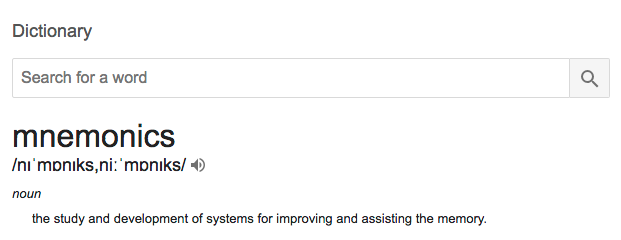
To understand how they work, you should first understand what mnemonics are. Before you start thinking this is going to be all technical jibber-jabber, remember this:
Nursery kids use mnemonics the most.
Yeah, you read it right!!
We are literally saying you should do what 3-year-olds do, for the same purpose: to improve vocabulary. If kids that young can use this simple tool, you can definitely use mnemonics for GRE.
Mnemonics are tools designed to help people remember things better. Here are a couple of examples you’re definitely familiar with:
“A for Apple, B for Ball”

Remember this? It’s a whole chart of mnemonic devices. In fact, this is exactly what we’re about to use right now!
It’s been proven that our memory works by creating webs of information – linking new information to what we already know. The more the links between known and new information, the easier it is to remember the new stuff we learned associated with it.
You know how you can suddenly remember someone’s name once you recall where and how you met them last?
Are things suddenly making a lot of sense now?
So, it’s safe to say that it is a great idea to learn GRE words with mnemonics.
The idea is this:
Increase the variety of information you have about the words you need to learn. Engage all your senses. This helps create a rich web of links with things you already know, so you remember these words easily.
Here’s a very basic example.
You hear the word ‘apple’. You know nothing else about this word. By itself, it doesn’t make much sense to you, you’re likely to forget it.
Then someone shows you a picture or drawing of an apple and you learn to associate a peculiar red shape with the word ‘apple’. When you hold an apple in your hands, your mind records how the surface of the apple feels; when you eat it, you remember the smell, taste, and texture of the apple.
You now have visual, auditory, tactile and olfactory information related to the word “apple”. Your chances of forgetting what “apple” means are next to none by this point.
But here’s the kicker:
You can’t get this much information about 3000+ words in time for your GRE.
Words in the GRE vocabulary are not those you’d find in daily life, you would have to go out of your way to learn most of them. Even then, it’d probably take years to really learn all those words this way!
Relax; we’re not here to tell you that you’re doomed.
Now that you know so much about how memory works, it’s time to look into how to learn GRE words with mnemonics.
Trick Your Brain with Mnemonic Flashcards
Let’s say you want to remember the word “extirpate”. The definition of the word is “to eradicate or destroy completely” or “to pull up by, or as if by, the roots”.
If you try to mug this up, you’re essentially trying to remember 15 words so that you can remember one.
Doesn’t make a lot of sense, does it?
Try this instead:
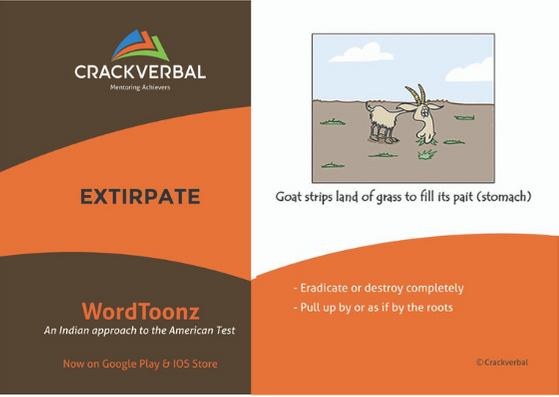
See what we did there? 😉
This is a GRE vocabulary flashcard. It is designed to tie the word ‘extirpate’ using multiple strings to the information you already know. This flashcard draws a comical connection between two things – it is a quirky and unusual association that you wouldn’t normally make.
Think about it. A goat would hardly be the first – or even among the first 10 – things to pop into your mind when you read the definition of ‘extirpate’.
These kinds of funny associations tend to stick out and therefore become easier to remember than the more ‘normal’ connections we make in our minds. It (hopefully!) also appeals to your sense of humor and that makes it even better. You see, we tend to remember the things we enjoy much more easily than things we find routine or boring.
Most importantly, the flashcard puts a picture to the word. It enriches the format in which you have engaged with the word ‘extirpate.’ Since pictures are much easier to recall than words, this is going to stick with you for a long, long time.
Here’s a fun fact:
The next time you see the word ‘extirpate’, you’re going to think of a goat.
If you start using the word regularly, after a few months or years, you will probably not even be sure why you associate the word with a goat. But you will think of a goat nonetheless because this is how you first learned the word – this is the power of first impressions.
At CrackVerbal, we have created a whole bunch of these GRE vocabulary flashcards. They are designed especially for Indian students, with references and cross-lingual puns that make them easily relatable. All of the flashcards carry GRE words with pictures and caricatures.
Here are a few more examples:
1. Profligate (adj.): recklessly extravagant or wasteful in the use of resources.
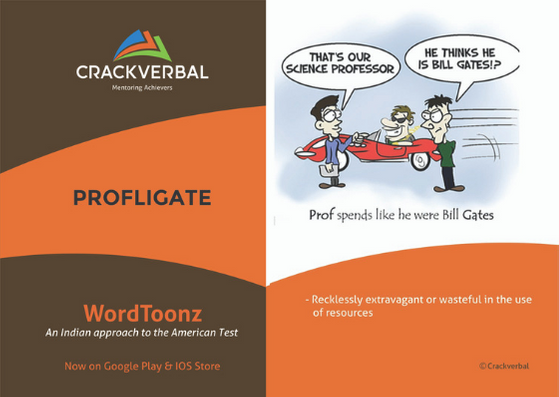
Profligate basically means a person who spends huge amounts unnecessarily. Here, we see a professor who is driving by in a fancy, high-end car that is definitely very expensive.
We all know that professors aren’t exactly the best-paid professionals around! So this is definitely a huge and unaffordable expense for this professor. He is spending a professor’s salary like Bill Gates – Prof(li)gate!
2. Quixotic (adj.): extremely idealistic; unrealistic and impractical.
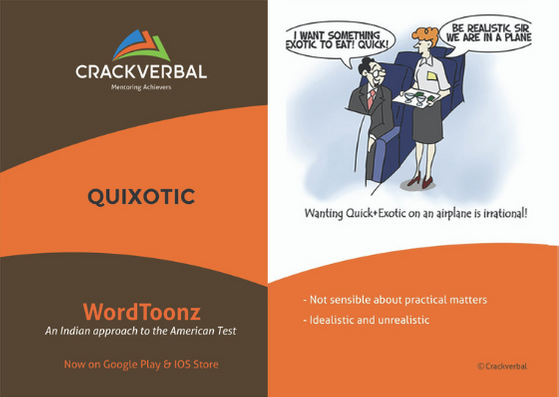
The word is pronounced ‘quik-so-tik’ and it is used to describe someone who tends to have unrealistic expectations.
This card shows a plane passenger who is demanding to be served exotic food quickly. Getting quick, exotic food on a plane is practically impossible – making this expectation unrealistic. So, the passenger is one quixotic guy!
3. Spoonerism (noun): accidental transposition of initial consonants in a pair of words.
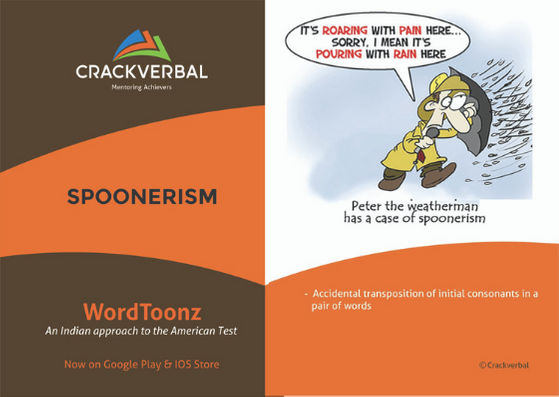
Let’s take a look at a simpler explanation for the same word.
You know how you misspeak sometimes, switching the first letters of two words in a sentence? Like saying “You hissed the mystery lesson” when you meant to say “You missed the history lesson.”
That’s spoonerism.
This flashcard presents one example but you can think up as many as you like!
Let’s take a look at a few more flashcards!
4. Abnegation
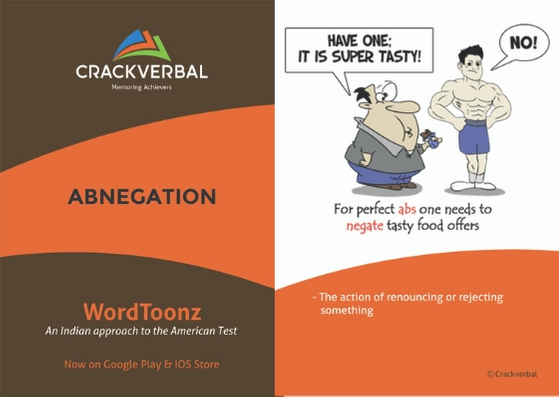
5. Recondite
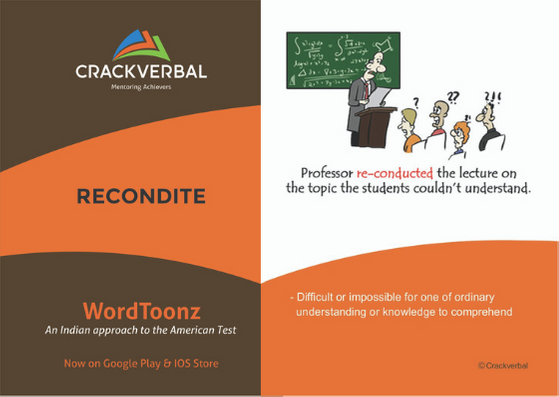
6. Galvanize
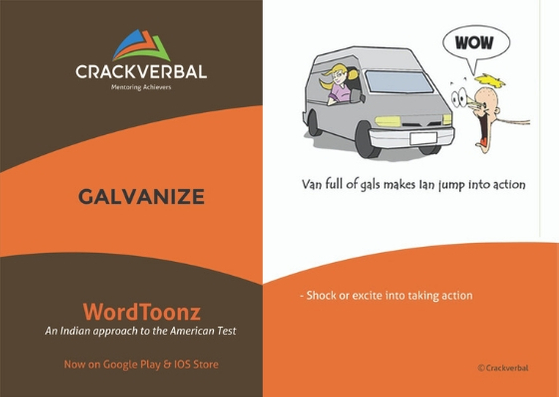
7. Desiccate

8. Lionize

9. Pedantic
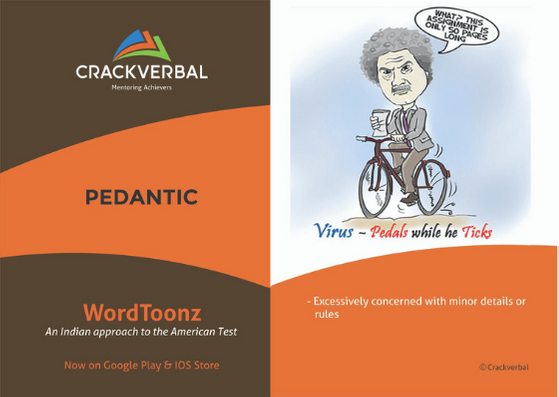
10. Disingenuous
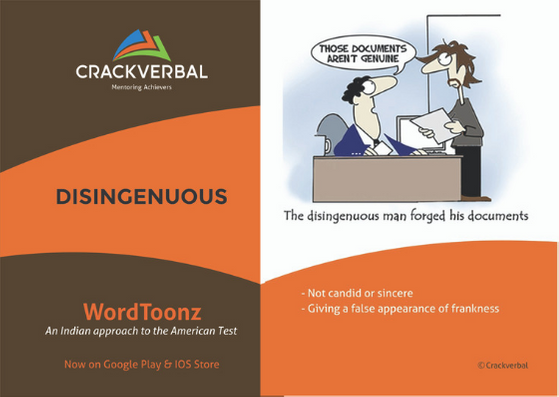
At CrackVerbal, we understand how the human mind is designed to work. We make it a point to devise teaching and learning techniques that exploit natural human tendencies to help you learn better.
As a result, the stress and anxiety associated with the GRE are both drastically reduced and your chances of cracking the exam are significantly raised.
Our GRE vocabulary flashcards work because:
- They associate pictures with every word.
- They make funny connections between words and the pictures they carry.
- They don’t give you more words to remember one word.
Take a look at our WordToonz Web App to get a better idea of how these flashcards can help you learn GRE words with mnemonics and test your progress, too!
